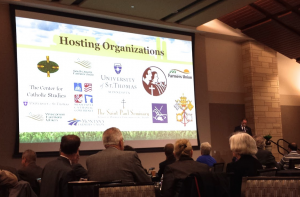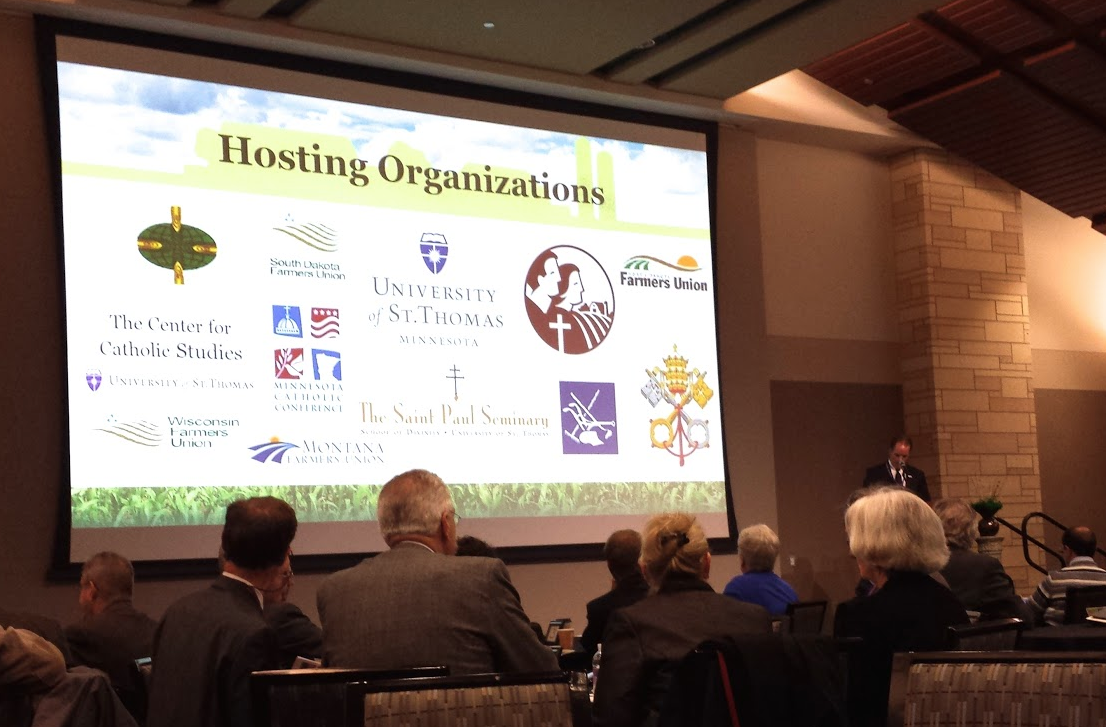The Faith, Food and the Environment Symposium opened the doors last week for St. Thomas students and faculty to discuss farming and food industry practices from a faith-based perspective.
The symposium, which lasted three days, featured more than 70 leaders from 14 different states, including international observers. James Ennis, executive director of the nonprofit campus organization Catholic Rural Life, said the event brought together people of all faith backgrounds.
Of the symposium’s attendees, 55 percent were Catholic, 40 percent were Protestant and 5 percent had no faith affiliation.
Ennis’ introduction laid out the problems farmers face and the symposium’s goal to discuss and solve them.

“Forces like globalization, industrialization, (and) biotechnology change the way farming is carried out across the world, and there are a lot of unknowns,” Ennis said. “There’s a lot of unknown territory, and today’s agricultural leaders must tackle some of humanity’s most important challenges from providing food for all to ensuring the vitality of the environment for generations to come.”
Ennis said agricultural leaders could find guidance in various faith traditions.
“We want to discuss … how our faith and wisdom of tradition can inform future leaders, men and women who have moved into agriculture, moved into food businesses, moved into responsible positions throughout the United States but also the world to talk about the care of creation in the midst of providing food for all,” Ennis said.
Christopher Thompson, dean of the St. Paul Seminary School of Divinity and one of the symposium’s speakers, said in some ways the symposium was the first gathering of its kind at St. Thomas.
“The conference provided an excellent opportunity to bring together growers, producers, theologians, policy makers and religious leaders in a common conversation about the challenges we face in maintaining a just and sustainable agricultural economy,” Thompson said. “Issues concerning the dignity of the human person within the framework of a sound ecology also emerged.”
Senior Caroline Stiles, a student organizer who became involved through her work for Catholic Rural Life, helped plan the symposium since June.
Stiles was in charge of all student volunteers, put up signs and banners around campus, helped with cleanup and passed pamphlets and materials out to guests. She said student volunteers had several different jobs, including scribing during lectures or greeting participants.
“There were kind of a whole slew of categories for volunteers,” Stiles said. “Some of the volunteers were scribes, so they were students who sat in on the different sessions, listened to the talk, and then there were facilitated table discussions after the talk … and the students would just sit and observe and take notes.”
According to Stiles, scribes helped contribute to the central idea of the symposium.
“The whole idea of the symposium is to come up with this document called the Vocation of the Agricultural Leader,” she said. “This symposium and all of these discussions and these sessions are to build kind of a resource and a conversation on what is the vocation of the agricultural leader. The notes just act as a tool for that.”
One of the leaders of the symposium, Cardinal Peter Turkson, canceled his appearance in order to focus attention on the Ebola crisis in West Africa. His scheduled lecture, “Faith and the Call for a Human Ecology,” was an event open to the public. His chief of staff, the Rev. Michael Czerny, delivered it instead.
Stiles said she had been looking forward to Turkson’s speech.
“It’s really too bad that he couldn’t come,” Stiles said. “But the symposium itself is more than just a person speaking. The symposium itself is supposed to be this conversation and this three-day discussion about all these topics, and so the fact that Cardinal Turkson didn’t come is unfortunate, but we still had his talk.”
Senior Leah Miller, a student volunteer, said it’s important to realize issues of food security, production and equity involve everyone, not just agricultural leaders or those who attended the symposium.
“Look around you. What do you see? A desk? Clothes? A Hot Pocket? And probably something plastic as well. These are all products and biproducts of agriculture; you are literally consuming it in all forms,” Miller said. “I think it is about time we gain awareness and appreciation of this fact, but also be critical and conscious of our decisions.”
Jamie Bernard can be reached at bern2479@stthomas.edu.



